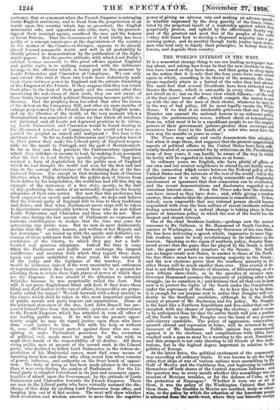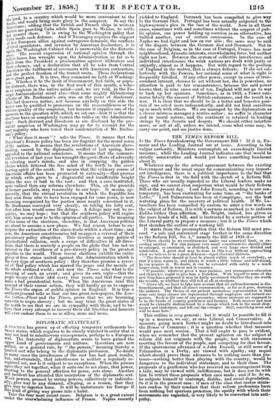THE WORLD'S INTEREST IN THE WEST.
IT is a somewhat strange thing to see our leading newspaper star- ing about, and asking how it can be that the new elections in Ame- rica have issued as they have done, and then going to sleep again on the notion that it is only that the four years have come round again in which, according to its theory of the moment, the Arne. means regularly attain to a hatred of the ruler they had adored. The mere fact that several Presidents have been reelected over- throws the theory, which is untenable in every view. We need not dwell on it; nor on the truer view which follows,—of the evil of the four years' term of office, which compels the nation to put up with the sins of the man of their choice, whatever he may do in the way of bad policy, till he must legally vacate the 'White House. If we find it an intolerable grievance that our Foreign Minister can commit the national honour to an unknown policy during the parliamentary recess, without check or remonstranee from us, what must it be to a re.pnblican people to see the mighty powers of their government (poworsigreater than sovereign and ministers have here) in the hands of -a ruler who must have his own way for months or years to cOtne
The Times may safely and easily demonstrate this mischief; but when it stops there, and supposes that the present unparalleled aspects of political affairs in the United States have been suffi- ciently treated of or accounted for by criticisms on the Presidential term of four years, it can hardly be aware of the way in which its levity will be regarded in America as at home.
In ordinary years, we English, who have plenty of affairs of our own and our nearest neighbours to attend to, are hardly aware of the connection which exists between the Federal policy of the United States and the interests of the rest of the world; but in this particular year it is only by a truly censurable and disgraceful carelessness or ignorance that that connection can he overlooked, and the recent demonstrations and disclosures regarded as of American interest alone. Even the Times asks how the elections can have issued as they have done ; and, while giving a random answer, thus admits that the phenomenon is remarkable. It does, indeed, seem impossible that any rational person should become acquainted with even the bare outline of recent incidents without feelino.° convinced that 'a radical change is taking place in those points of American policy in which the rest of the world has the deepest and closest interest.
One of the chief Southern leaders,—perhaps now the nearest successor to Mr. Calhoun, is Mr. Hammond of South Carolina, a senator at Washington, and formerly Governor of his own State. He has been delivering a speech which, impressive to mere Eng- lish readers, must be truly revolutionary in its influence on his hearers. Speaking as the organ of southern policy, Senator Ham- mond avows that the game thus far played by the South is fait lost ; the game of parallel numbers in the Senate. The South can no longer create new States, to answer to those of the North: the free States must have an increasing majority in the Senate ; and the new elections prove that the southern minority in the other House will be much smaller than ever. This avowal of de- feat is not followed by threats of disunion, of filibustering, or of a new African slave-trade, as in the speeches of meaner men. Governor Hammond assumes the necessity of yielding after a fair struggle, (as he considers it,) and declares that all that can be done now is to protect the rights of the South under the Constitution, under the supremacy of the South. As to how this is to be done, it is enough for our purpose now to notice that Douglas will evi- dently be the Southern candidate, although he is the deadly enemy at present of Mr. Buchanan and his policy. Mr. Douglas is the least like a Northern Republican and free-seller that can be accepted, with any chance of carrying the election • and it seems to be anticipated thus far that the entire South will join a portion of the North to carry Mr. Douglas over the head of any genuine anti-slavery candidate. The policy of aggression, annexation, quarrel abroad and repression at home, will be reversed by any successor of Mr. Buchanan. Public opinion has pronounced against it in the elections, and complications with allies have reached such a pass as must be a warning to the next President; and this prospect is not only cheering to all friends of free insti- tutions, but in the highest degree important in relation to the .politics of Europe.
At the latest dates, the political excitement of the community was exceeding all ordinary limits. It was known in all the isle cities that ships of war of various nations were assembling in the Gulf of Mexico and the Caribbean Sea' and beginning to exhibit themselves off both shores of the Central American Isthmus ; and the question was in every month whether this assemblage was on account of Mexican troubles' or for the defence of Cuba, or for the protection of Nicaragua? Whether it were one or all of these, it was the policy of the Washington Cabinet that took them there. The troubles in Mexico are ascribed, truly or other: wise to the policy by which the attention of the Amerman peuFe is attracted from the north-west, where they 'earl hbnestly 00011 the laud, to a country which would be more convenient to the outh, and would bring more glory in the conquest. So say the Americans ; adding that the British and French ships in western waters are guarding Cuba while Spain goes to Mexico, to settle her quarrel there. It is owing to the Washington policy that ha needs such defence. And if Nicaragua requires the support Cu of her European allies against outrageous demands, the conflicts et' rival speculators, and invasion by American freebooters, it is aziin the Washington Cabinet that is answerable for the disturb- aim, The recent expression of national opinion through the ballot-boxes has wrought upon the Administration so far as to elicit from the President a proclamation against filibusters and their schemes, and a declaration that all he asks from Central America is the fulfilment of covenants with American contractors, ouJ the perfect freedom of the transit route. These declarations are a great gain. It is true, they command no faith at Washing- ton. Whether it be the fault of Government, bad faith, or popu- lar distrust, there was, in the first week of• this month, a vehe- ment suspicion in the native mind—and, we are told, in the Fo- reign Ambassadorial mind also—that some mighty filibustering scheme of Mr. Buchanan's own was on the point of disclosure. This fact deserves notice, not because anybody on this side the water can be qualified to pronounce on the reasonableness or the vicious quality of the suspicion, but because it supplies one of the answers to the question with which we set out—how it is that the elections have so completely turned the tables on the Administra- tion? Such distrust and disesteem as are disclosed by the pre- valent suspicion at Washington may go far to account for the vast majority who have voted their condemnation of Mr. Bucha- nan's policy. "What does it mean " ? asks the Times. It means that the President's Kansas policy has been too .flafrant for the moral sense of the nation. It means that the revelations of American slave- trading, caused by the diplotnatic conflict of last spring, have appealed to the national conscience. It means that the commer- cial revulsion of last year has wrought the vial effects ,of adversity in sobering men's minds, and also starJing the golden chains which fettered the 'free mind of the nOrth to the over- bearing spirit of the south. It means that the 'Ordinary course of American affairs has been protracted to extremity—that process bf which evils grow to a disgraceful and insufferable height• before the axe is laid to the root; and then a cure instituted, more radical than any reforms elsewhere. This, on the grounds of former parallels, may reasonably be our hope. It means, ap- parently, that the virtual revolution in which the Republic has been seen front afar to have been engaged for some years, is now becoming recognized by the parties most nearly concerned in it. Mr. Buchanan conveyed very clearly, on taking his lofty seat, that after him would come the deluge. A deluge may not be re- quisite, we may hope ; but that the southern policy will expire with him seems now to be the opinion of all parties. The meaning of this issue of the elections, therefore, is that American politics are about to assume a new phase. We had reason before to an- ticipate the extinction of the slave-trade within a short time ; and now, the American constituencies bid us expect a reversal of their pro-slavery policy altogether. This involves so many points of international collision, such a range of difficulties in all direc- tions, that there is scarcely a people on the globe that has not an interest in the overthrow of a pro-slavery policy in the greatest republic in the world. These recent elections exhibit the entire group of free states united against the Administration which is the very type of southern policy : they therefore promise a rever- sal of that policy which has marred the peace and the morals of the whole civilized world ; and now the Times asks what is the meaning of such an event; and gives its own reply—that the people weary of their idol every four years, and that four years make a bad presidential term. When the Americans read this account of their recent action, they will hardly go on to suppose the Times the organ of public opinion in England. It is true a southern journal tells us that our two great newspapers, the _Lon- don Cotton-Plant and the Times, prove that we are becoming converts to negro slavery ; but we may trust the great states of the north to see that we are in sympathy with them, and to be- lieve that every attempt to recover their old liberties and honours will ever endear them to us as allies, more and more.



























 Previous page
Previous page